There is a lot of buzz and fuzz regarding the influence of shares, comments, likes, etc. on SEO in general. Yet, the question that is on everyone’s lips is actually: “Are social signals a ranking factor?” There have been lots of discussions around this topic, both pros and cons; even some studies were conducted on it. Yet, no clear light has been shed on the matter. If social signals affect SEO, how does it happens?
And, as we think that research is one of the most exciting and, most of all, rewarding of occupations, we’ve conducted an in-depth investigation in order to find out exactly this. What we wanted to see was whether there is any good reason to believe social networking sites have any relation to page ranking beyond anecdotal evidence. In order to study this relation, we needed quite a bit of data, therefore I warn you that you might need to arm yourself with a lot of time and coffee before reading our study.
TL;DR – This is quite a large study. If you don’t have time to read it all now, you can browse through the main take-aways.
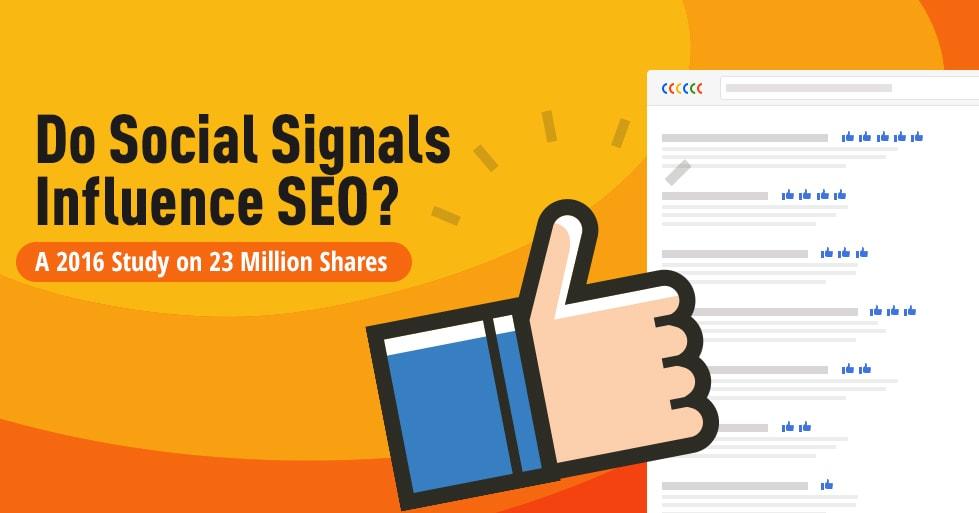
- The Methodological Approach – How the Research Was Done
- Strong Presence on Social Networks Is Correlated with Better Rankings
- Higher Rankings are Correlated with Facebook, Google +, LinkedIn & Pinterest High Shares Altogether
- Top 4 Ranking Positions Have Significantly More Facebook Activity
- The Average Google+ Shares for the 1st Rank is Significantly Higher
- No Direct Correlation Can Be Made Between LinkedIn Activity and Ranks
- Pinterest High Shares Don’t Correlate at All with High Rankings
- Sharing Activity Correlated With Rankings and the Content’s Length
- Content Between 1 – 50 Words Is Correlated with High Facebook Activity and 1st Ranks
- There Is No Correlation Between FB Activity and Ranks when We Look at Long Content
- Micro Content that Ranks 1st Is Correlated with High G+ Shares
- Slightly Linearity Between G+ Shares and Ranks for Long Content
- LinkedIn High Shares Correlate with Micro Content Ranking 1st
- Pinterest Shares Do Not Correlate With Ranks When Looking at Micro Content
- Linear Correlation Between Pinterest shares and Ranks When Looking at Long Content
- Some More Methodological Clarification
- Other Relevant Studies & Google’s Position
- Conclusion
The Methodological Approach- How the Research Was Done
We wouldn’t want to bore you with a lot of technicalities related to the research, however, allow us to present you the study’s main points:
- The current study is based on social signals coming from Facebook, Google+, Pinterest and LinkedIn. We couldn’t include Twitter into this analysis due to their decision of deactivating share counts.
- We took into consideration all social signals from approximately 300k pieces of content, coming from ~34k randomly chosen keywords that rank on Google on positions 1 to 10. All the research data were gathered over the months of May and June 2016.
- The current study shows a correlation between social signals and the search engine Google. Yet, correlation does not mean causation.
One methodological clarification we’d like to mention is that the mean values were calculated for all entries which had at least one like, share or comment (therefore greater than 0), but less than 100.000. The upper limit was set for both theoretical considerations (social signals presence above that level tends to be rarely organic) as well as pragmatic ones (given the scale, even a small number of values over that threshold can influence a rank’s score and make it unrepresentative).
Strong Presence on Social Networks Is Correlated with Better Rankings
On average, social presences (which includes likes, shares and comments on Facebook, plus shares on Google+, LinkedIn and Pinterest) are negatively associated with site rank, and the relationship is close to linear (and perfectly linear for the first 5 ranks). This means that, in general, the smaller the rank number is (so, the higher up the website), the higher the chances are that the average presence on social network is larger.
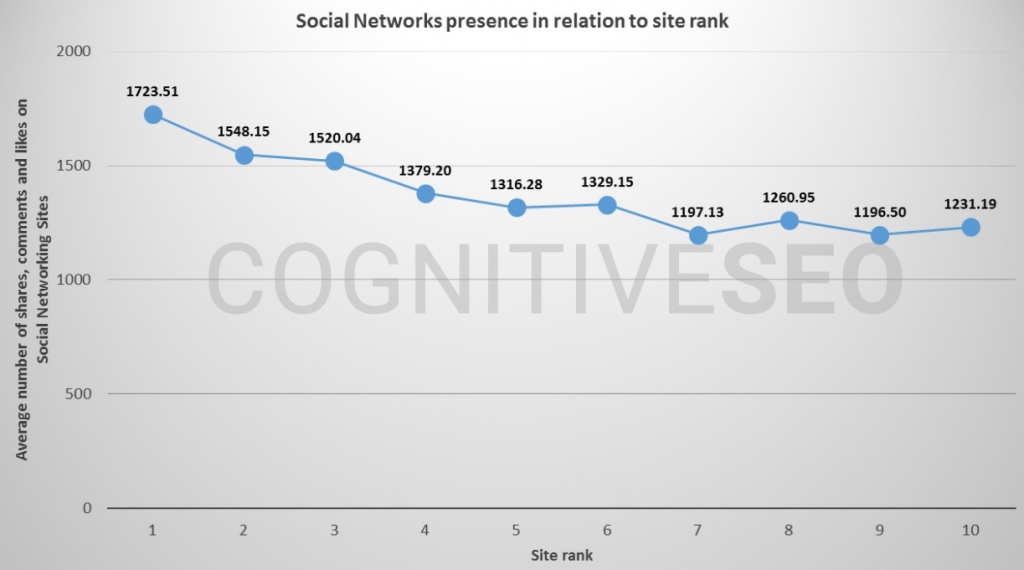
Higher Rankings are Correlated with Facebook, Google +, LinkedIn & Pinterest High Shares Altogether
This holds true for almost all of the individual social channels as well, though the linearity of the relationship varies. Facebook (overall activity, including likes, shares and comments) and Google+ are the closest to a perfectly linear relationship, each with 2 “deviations” from the expected values. LinkedIn’s relation to site rank is decidedly less linear, although the overall trend still holds true. The one site that stands out is Pinterest, because there is no linearity whatsoever, and also because it is the only social platform where the highest number of shares is not associated with the first rank.
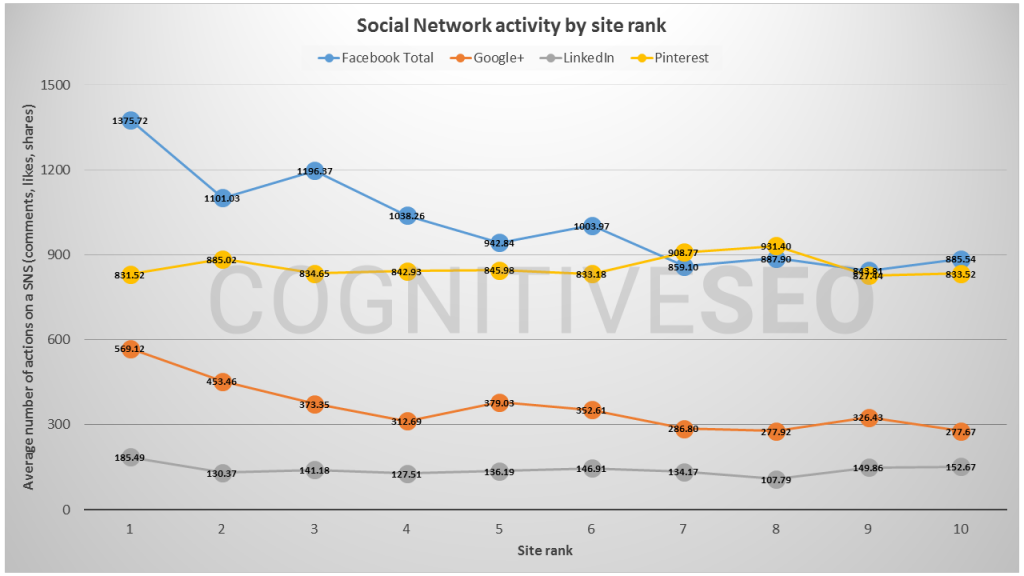
Top 4 Ranking Positions Have Significantly More Facebook Activity
Even with Facebook, things are slightly more complicated. For Likes, the linearity is broken from the second rank, but except for that it holds true for the first 5 ranks and the top 3 all have significantly higher numbers than the rest.
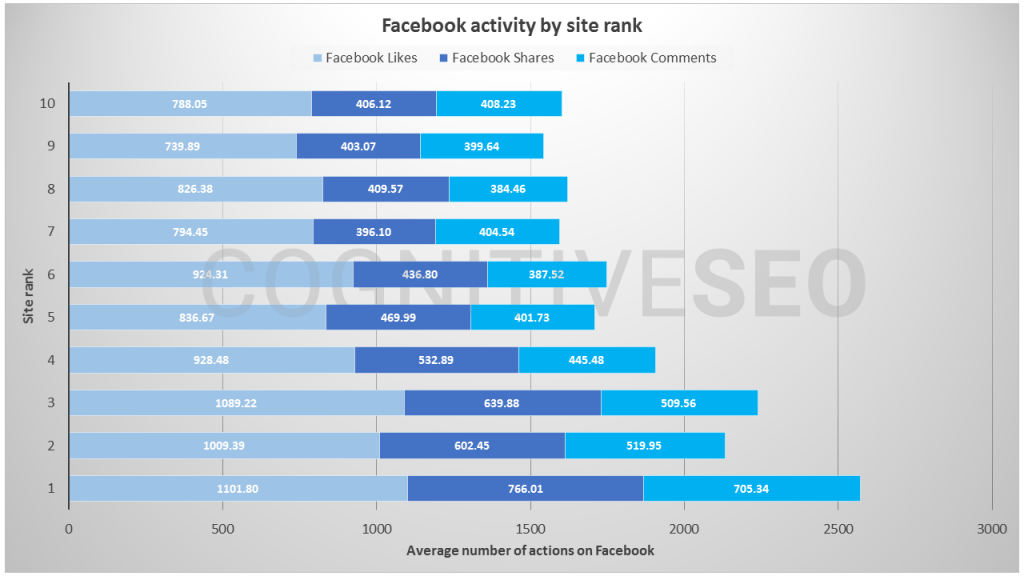
More Shares are associated with higher ranks (so, then, lower rank numbers) in a clear fashion for the first 7 ranks and, again, the first 3 ranks are significantly higher than the rest (with the first being significantly higher than the next two).
Comments maintain the linearity for the first 6 ranks and the first rank has significantly higher numbers than all that follow. Overall, while no causality can be inferred, more presence on Facebook is clearly associated with a higher rank on the search list.
The Average Google+ Shares for the 1st Rank is Significantly Higher
With Google+, the linearity is still there, overall, but more so in brackets. There is a clear streak from the 1st to the 4th rank, than another from the 5th to the 8th. Furthermore, the mean for the first rank is significantly higher than the other values, as is the difference between the mean values for the first two ranks, compared to differences between any other two ranks.
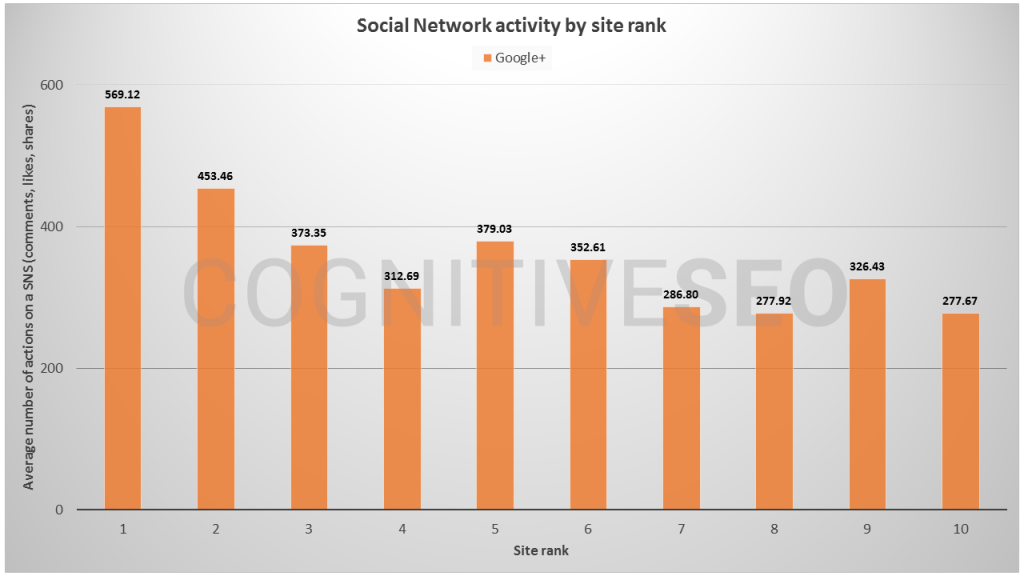
No Direct Correlation Can Be Made Between LinkedIn Activity and Ranks
For LinkedIn there isn’t much of a linearity, save for, maybe, the one that can be seen for ranks 6 through 8 (but to draw any conclusion about all ten ranks would be a stretch). What can still be said with certainty is that the mean for the first rank is higher than for any other rank. Still, it’s difficult to claim anything about associations beyond that, since the second highest mean value corresponds to the 10th rank, while the lowest mean corresponds to the 8th rank.
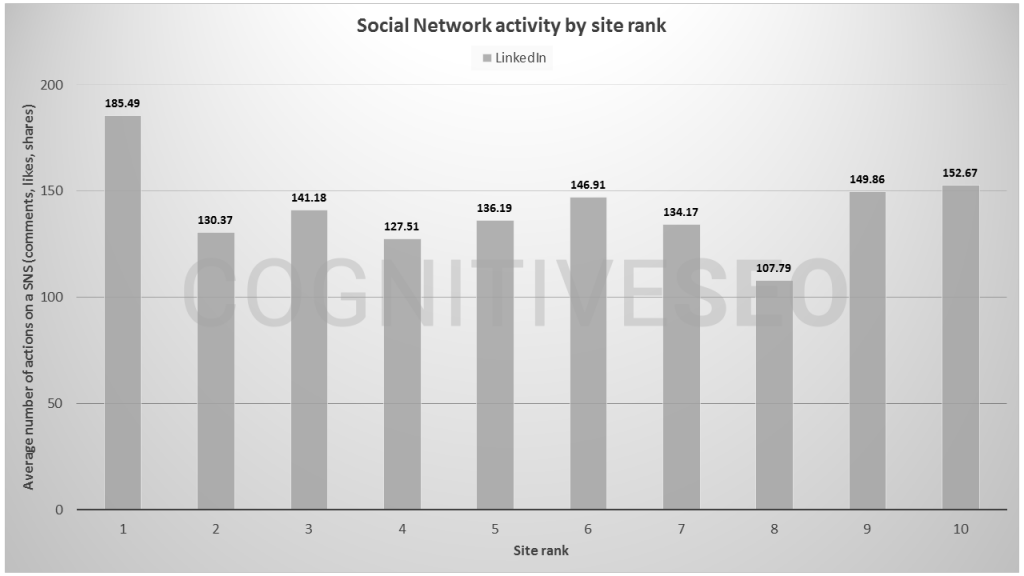
Pinterest High Shares Don’t Correlate at All with High Rankings
Pinterest is the one social network that stands out for two reasons. The first is that there is clearly no linearity whatsoever (at least not in the direction of the same relation that we’ve seen for Facebook and Google+). The second reason is that this time, the highest mean value of shares isn’t even associated with the first rank. The two highest values are associated with ranks 8 and 7, respectively. In fact, the mean for the 1st rank turns out to be the 9th highest (and ironically, the only mean that’s smaller is the one for the 9th rank). This is not to say that you shouldn’t try to be getting as many shares on Pinterest as possible, but rather that they will most likely not be a good indicator of overall search results ranking prowess.
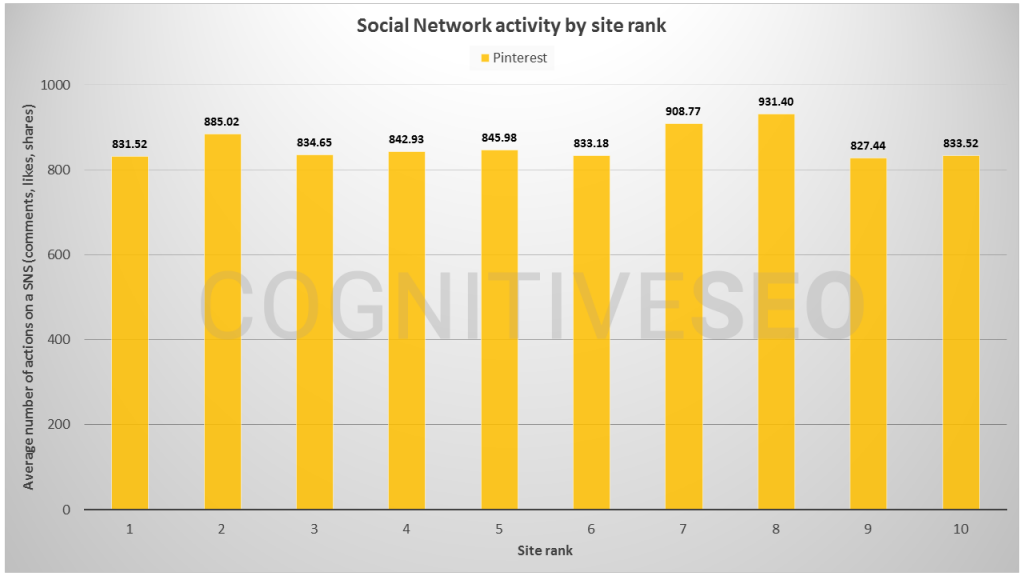
There is a strong correlation between ranks and social activity in general, yet, each social network needs to be analyzed in particular in order to draw the right conclusions.
Sharing Activity Correlated With Rankings and the Content’s Length
In an earlier study conducted in the cognitive labs we figured out that shorter articles are usually correlated with higher rankings. But is it a connection within a post’s length, its number of shares and rankings? (consider rephrasing) With this precious data at our disposal, we’ve decided to see whether there is a connection between the content’s length, the number of shares and rankings.
We’ve classified all >300k posts into categories that went from 1 to 10k words. We are going to stress on two categories that we found more relevant.
- Content between 1 – 50 words. We’re basically looking at micro-content here. We chose to take this category into discussion as, usually, the first thing that comes to mind when we talk about social media is short content.
- Content between 1001-5000 words. We chose this category as this length of content is the “winner” in terms of rankings, as you can see in the screenshot below.
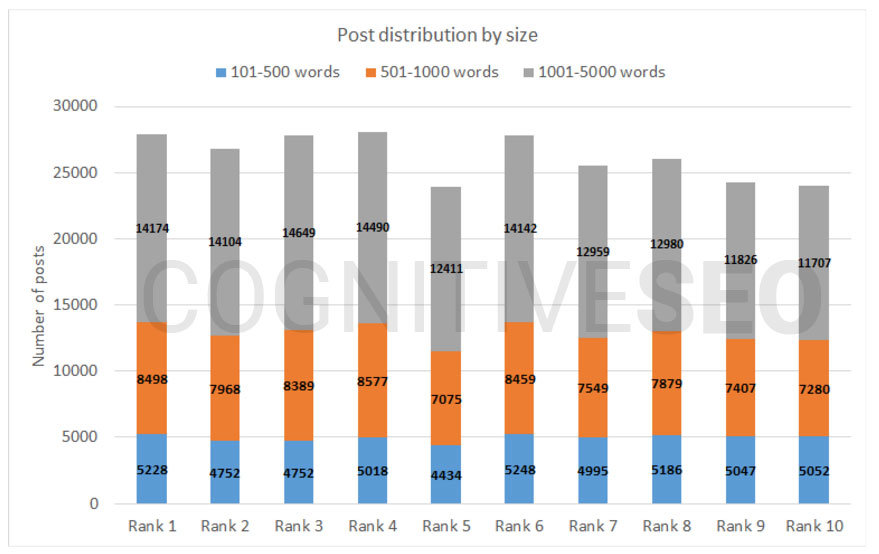
Content Between 1 – 50 Words Is Correlated with High Facebook Activity and 1st Ranks
As predicted, when it comes to micro-content, we can see a huge difference between the first position and all the others. Even if we sum up all the other nine positions’ number of shares and we still don’t get the high number of likes, shares & comments that the first rank holds.
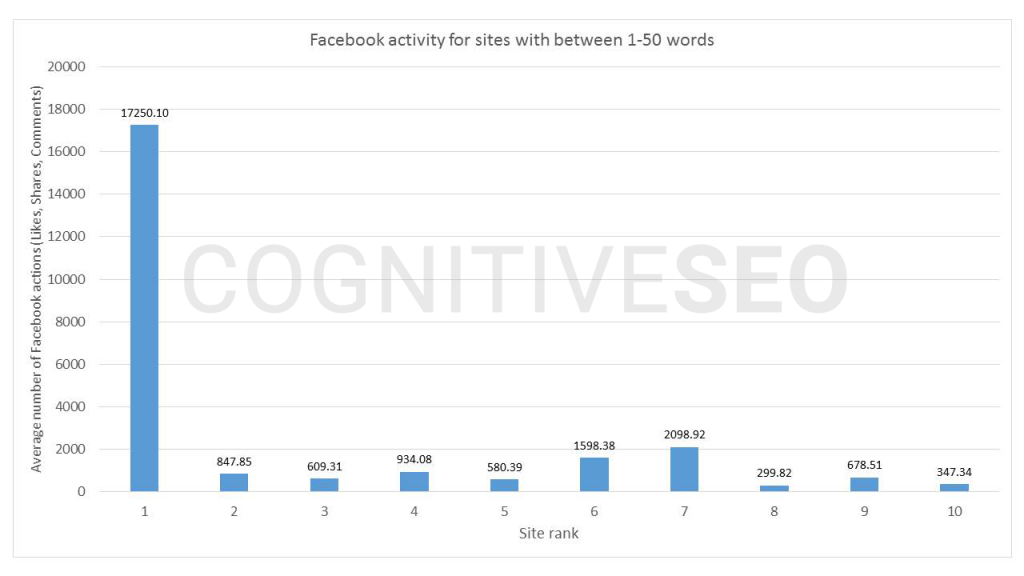
There Is No Correlation Between Facebook Activity and Ranks when We Look at Long Content
When it comes to posts that are usually successful judging by the number of words, we cannot say that the same success replicates when it comes to the number of Facebook activities for the first ranks. We are talking here about the number of Facebook shares, likes, and comments altogether. Yet, a direct correlation between Facebook activity and ranks for content that has between 1001 and 5000 words cannot be made.
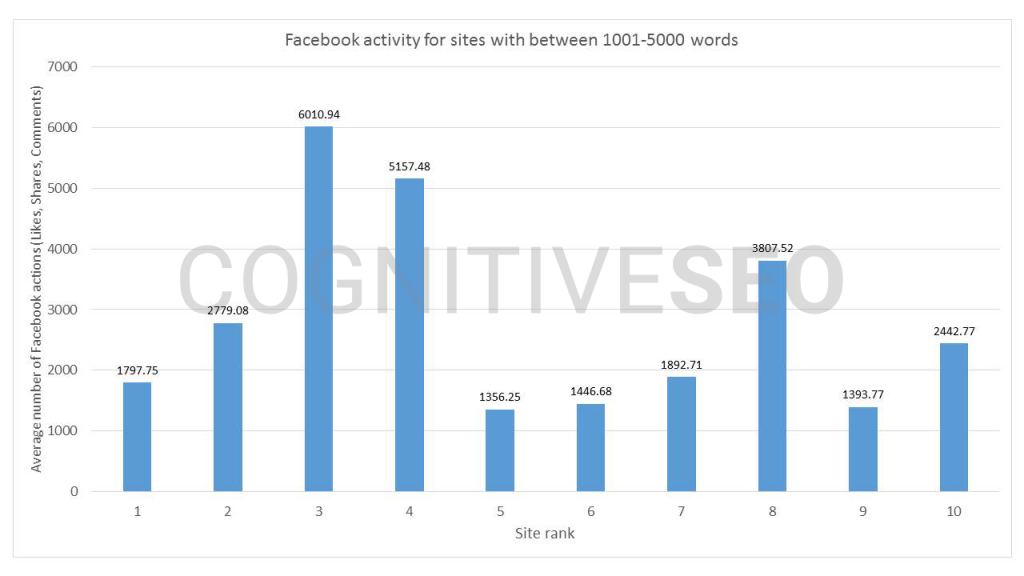
Micro Content that Ranks 1st is Correlated with High G+ Shares
As in the case of Facebook, micro-content seems to make a real breakthrough. Yet, although we can see a high correlation between the first position and the number of Google+ shares, same linearity does not apply for the rest of the positions. For instance, there are almost the same number of shares for the second position as there are for the 7th. However, a strong correlation can be made between micro content, high Google + shares and first organic search ranking position.
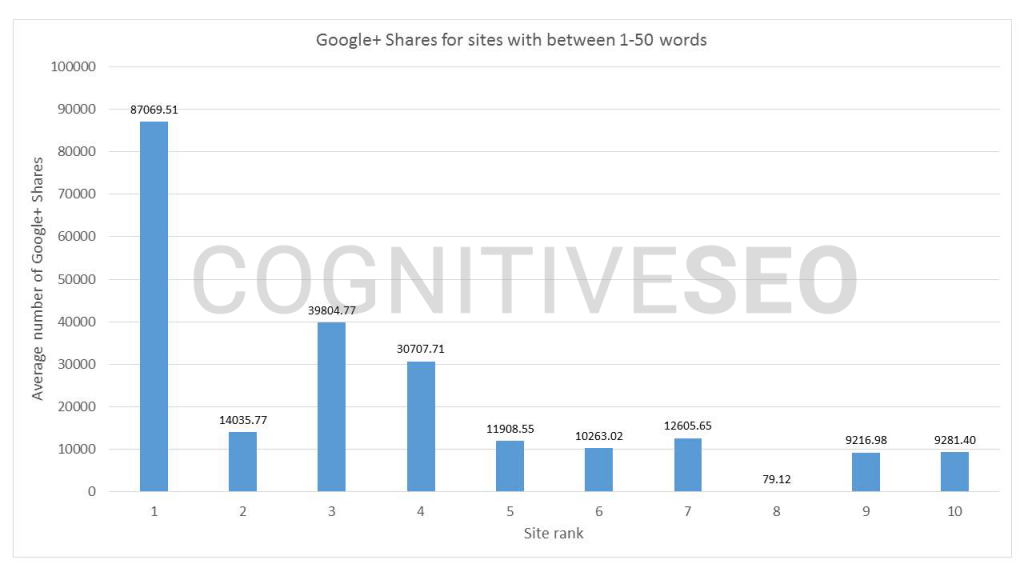
Slightly Linearity between G+ Shares and Ranks for Long Content
When it comes to content between 1001-5000 words we can see a sort of a linearity which, although not a consistent one, is still better than in the case of Facebook. Except the third position, all first six positions seem to be following a sort of consistency when talking about the relation between G+ shares and ranks.
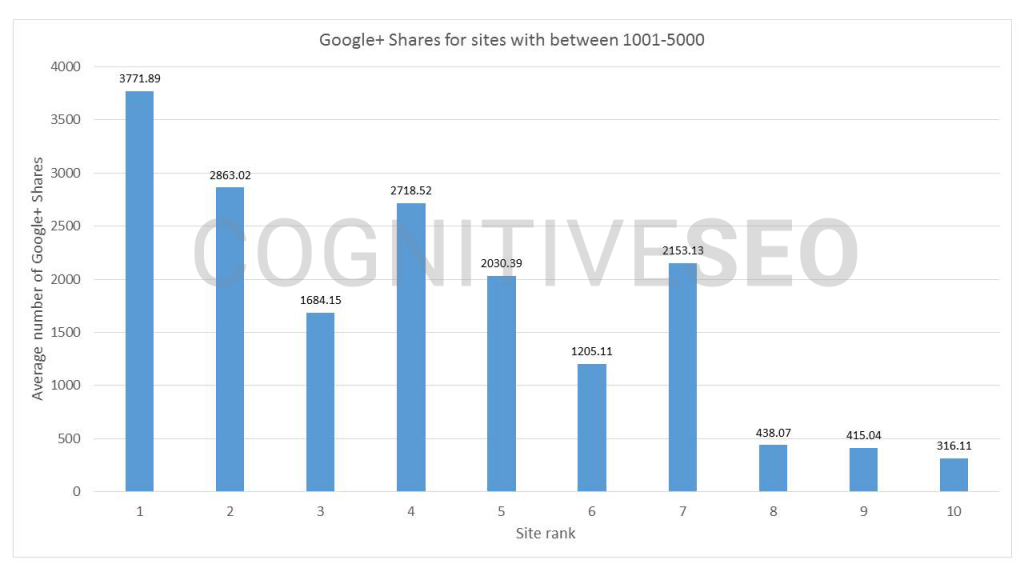
LinkedIn High Shares Correlate with Micro Content Ranking 1st
If we couldn’t determine a strong correlation between ranks and LinkedIn activity when it comes to the total sample, when looking at content with 1-50 words it looks like we can definitely say that there is a correlation between LinkedIn shares, micro-content and ranking in search on the first position. Then again, just like in the previous cases, there is no direct correlation when it comes to the other ranking positions; yet, the relation with the first position is so strong that it might raise some interest.
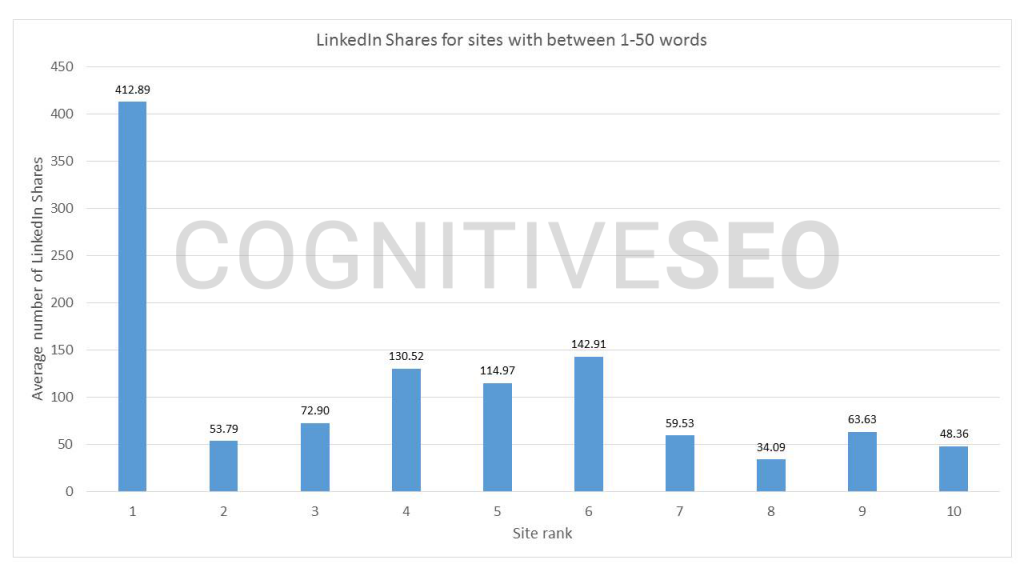
For 1001 – 5000 words content, LinkedIn seems to correlate with ranks just like it usually does…or, better said, doesn’t. Just by taking a look at the chart below we can figure out that there is not a strong correlation between Linkedin Shares, medium length content and ranks.
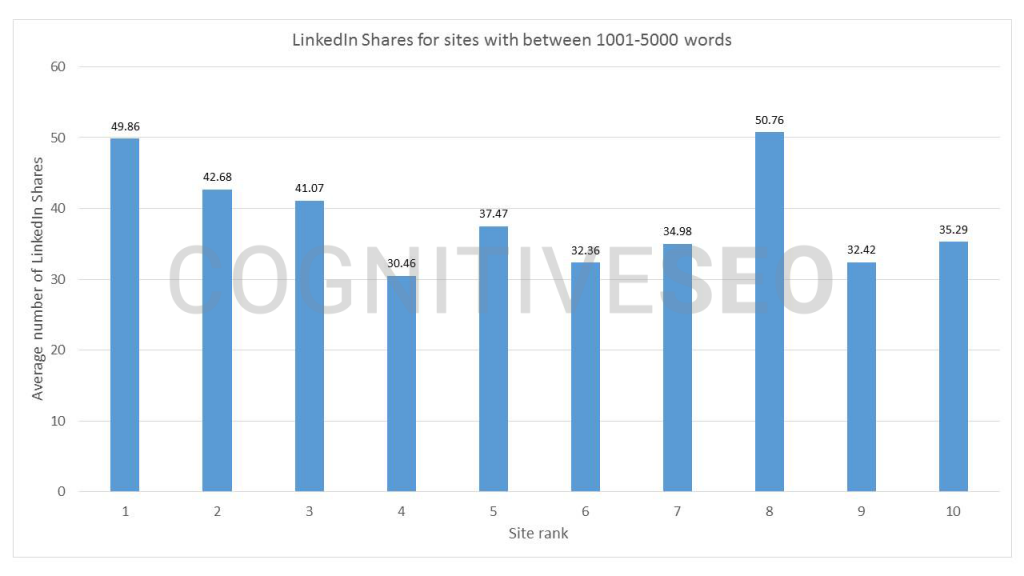
Pinterest Shares Do Not Correlate With Ranks When Looking at Micro Content
Pinterest continues to have the same peculiar behavior no matter of the sample of content and ranks we are looking at. Indeed, micro content ranking first has by far the most Pinterest share, yet, we cannot talk of any sort of linearity as all the other positions don’t seem to express that. Just by taking a look at the chart below we realize that “correlation” or “linearity” are not the most suitable words to be used in this context.
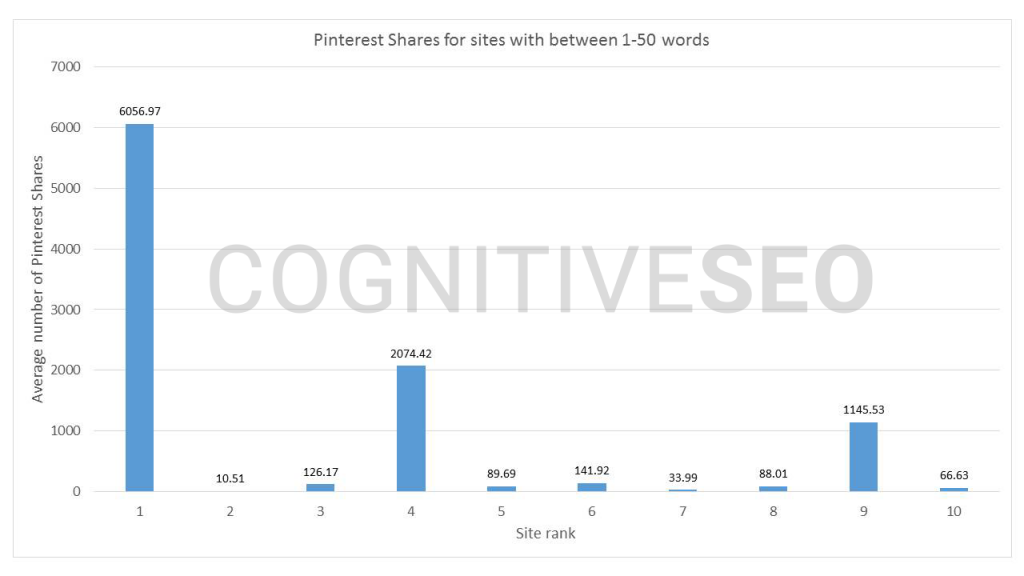
Linear Correlation Between Pinterest Shares and Ranks when Looking at Long Content
As mentioned earlier, Pinterest seem to be special when it comes to posts with 1001 – 5000 words, only that this time, in the sense that it’s the social network that has, probably, the most clear linearity between the number of shares and ranks when it comes to medium content.
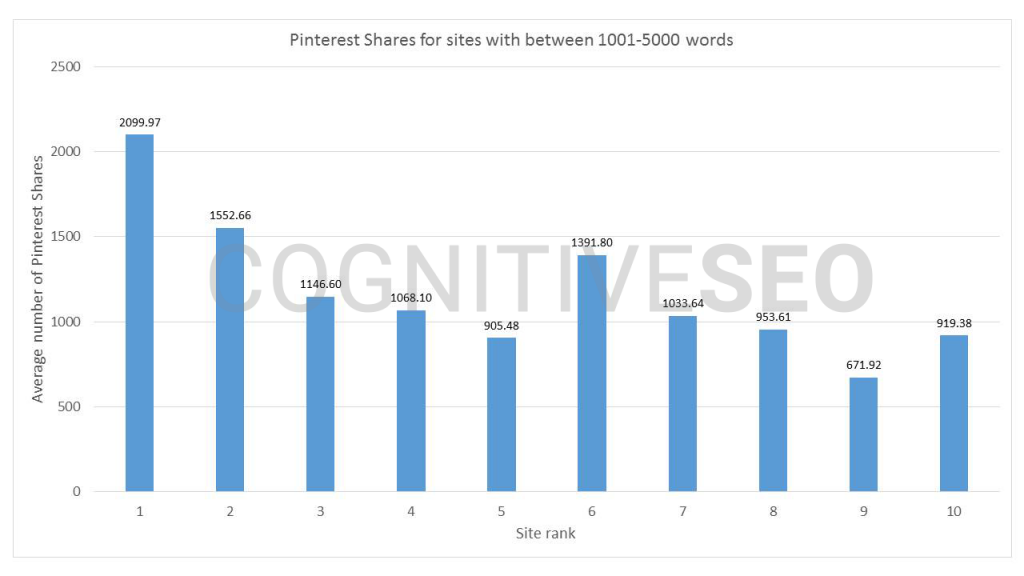
Some More Methodological Clarification
Please indulge us while explaining why we chose to look only at the social signals coming from top 10 organic search results. In search engine pages, this usually means that we only looked at the first page of a web search. We chose to do so because, to be honest, if you’re not in the top 10 there are really small chances for a user to find your page by performing a search. There are several studies on this and results may vary, but there’s a world of difference between being on the first and being on the second page. As you can see below, even by the most conservative of estimates, the difference between being on the first page and being on the second is quite staggering.
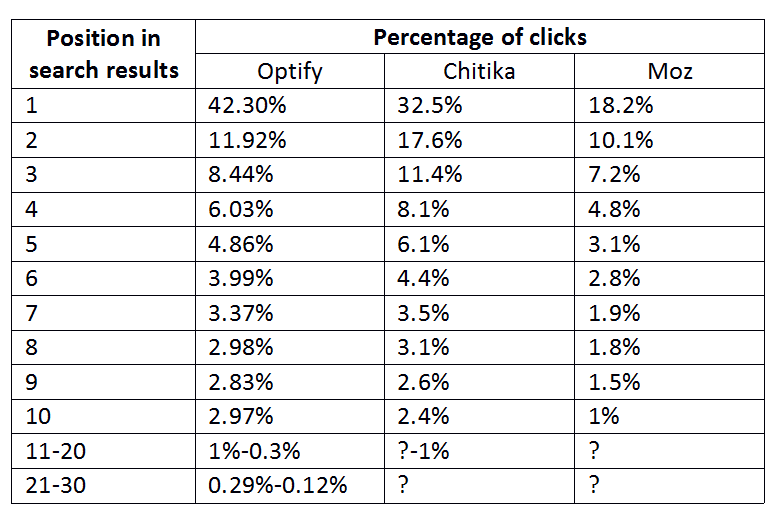
Optify study: http://www.my.epokhe.com/wp-content/uploads/2011/05/Changing-Face-of-SERPS-Organic-CTR.pdf
Chitika study: https://chitika.com/google-positioning-value
Moz Study: http://moz.com/blog/mission-imposserpble-establishing-clickthrough-rates
In terms of pages, the Optify study claims the first page of results rakes in about 89.69% of the results, while the Chitika one puts the number at 91.5%. The Moz study, by comparison, puts that number at 52.40%, a much lower figure. It’s also the more recent study, so there’s a possibility it is slightly more accurate.
Other Relevant Studies & Google’s Position
As we were mentioning before, a lot of discussions and even studies were conducted on the importance (or lack thereof) of social signals in rankings.
While some of them, like the Moz study, claim that there is strong reason to believe Google doesn’t use social share counts directly in its algorithm, there are other positions on this, like Neil Patels’, that highlight the fact that there might be a strong connection between the two (just like we can see in the screenshot below taken from the Quick Sprout’s gifographic).
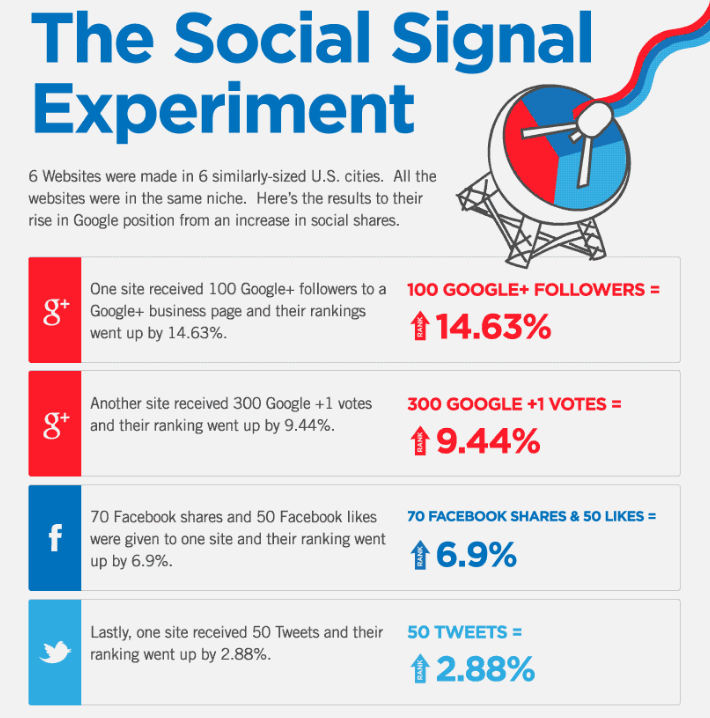
There are several opinions about the role of social signals in organic SEO rankings. Of course, even Google, through Matt Cutts (currently on an extended hiatus from his job as head of Google’s web spam team) had something to say about this. Long story short, what the search engine communicated in 2014 was that Google treats Facebook and Twitter posts like any other web pages for search, but NOT as a ranking factor. And why would they do so? Because, as Google says, they won’t use a signal to influence its search rankings unless they have high confidence in the meaning of that signal.
According to Cutts, one should be active on social networks for many good reasons, yet, ranking high wouldn’t be one of those. John Mueller, Webmaster Trends Analyst at Google also insisted that that there is no direct ranking signal in Google’s ranking algorithm.
We cannot agree more that one should be present on social media not for rankings but for building up their brand and driving qualified traffic. Yet, the present study made us wonder if indeed Google is doing what it’s preaching and whether Google’s engineers don’t “monetize” social signals.
Conclusion
It’s the shares that lead to a better position, or sites with a higher position naturally get more shares?
Now that all the numbers are in, it’s important to set one thing straight. It’s the old scientific motto that correlation does not imply causation. To be fair, we’ve never claimed we have been trying to prove (or disprove) that a higher presence on social networking sites will lead to a higher place in search engine rankings. We’re merely observing that there is some relation between the two, though the exact nature is probably more complicated than that and might not even be the same for all the social networks.
Even the tests that we did on the data aim merely at establishing the strength of a correlation, not the directionality of a causal link. So we know there is some relation between shares and position in the rankings list, we’re just not sure whether it’s the shares that lead to a better position, or sites with a higher position naturally get more shares.
That being said, it’s probably also worth mentioning another recent adage, coming from the creator of the XKCD web comic, which states that “correlation does not imply causation, but it does waggle its eyebrows suggestively and gesture furtively while mouthing ‘look over there.’“ Which is to say that just because we cannot definitely state that more shares on a social network will lead to a higher position in the rankings list, it doesn’t mean it can’t happen. We just have to take other things into account as well.
Who did this research
 Razvan Gavrilas
Researched & Audited the Analysis
Razvan Gavrilas
Researched & Audited the Analysis Cornelia Cozmiuc
Researched & Wrote the Paper
Cornelia Cozmiuc
Researched & Wrote the Paper Ionut Astratiei
Performed the Crawlings
Ionut Astratiei
Performed the Crawlings
and Data Validations

 Site Explorer
Site Explorer Keyword tool
Keyword tool Google Algorithm Changes
Google Algorithm Changes Ionut Astratiei
Ionut Astratiei


WOW… really? Social signals?
Studies like this crack me up. Did you consider other ranking factors that could have tempered with the results? Like backlinks?
Social media shares usually attract organic backlinks that these studies don’t put into consideration and we know Google and other tools don’t show all backlinks.
There’s also other factors like what type of competition you’re up against.
And there is no relation between shares and position in the rankings list. Except for Bing & Yahoo, they bluntly tell you social signals do play a role in their algorithm.
But not in Google, not today. Nofollow links were dropped in the link graph, they don’t count. Next thing you’ll be telling us nofollow links can help improve rankings? Hope not.
Forgive me for sounding harsh, but stuff like this is just a waste of time for readers. Your conclusion is not even a conclusion, it leaves a lot of questions.
So teach people what works, period.
Thanks a lot for your message. As stated, this is a correlation study and not a causality one. There is a relation between Google rankings and shares, that’s for sure. Yet, there is more to investigate in order to find out if the shares lead to a better position, or sites with a higher position naturally get more shares.
Nofollow does improve rankings – just at a far decreased amount – want proof? Give yourself a naked link from Forbes with no content around it and no contextual content for Google to help classify the link in anyway with your brand or topic and I guarantee you it will help your ranking and you will see a few more keywords pop up on your list that will have nothing to do with your brand …
Conclusion stated another way: Which is to say that just because we cannot definitely state that higher position in the rankings list will lead to more shares on social networks, it doesn’t mean it can’t happen.
Scott, thanks for your message!
Indeed, in the conclusion I’ve highlighted the idea that is a correlation we are talking about and not a causation. Yet, this doesn’t mean that shares are not influencing rankings.
However, at this point is hard to decide if the shares lead to a better position, or sites with a higher position naturally get more shares.
I think sites with a higher position naturally get more shares.These days You will find hardly any irrelevant and uninteresting articles ranking on google’s first page. Only The best articles ranks on the first page of google and naturally they get more and more shares.
Indeed, Subhadip!
High number of shares can indicate high quality content and therefore, naturally they might rank better.Yet, we do not know for sure if shares lead to better positions, or higher positions naturally get more shares.
great article. nowadays, getting high rank does not require high social shares and likes. i think social medias helps a lot to gain traffic to the website.
Really glad you liked the article; hope you got some great insights from it.
Excelent work Cornelia.
I would like to know what Google did you use? Google.com ?
All the 34k keywords was in english?
Is there any page that shows part of this keyword list?
Regards.
Thank you, Cristian!
Glad you liked it 🙂
All the 34k keywords were in English from Google.com, ranking on positions from 1 to 10, randomly chosen. We didn’t share the keywords as we didn’t want to stuff the article with it.
According to me, i have personally did an experiment with social signals. I had a keyword with an keyword difficult of 40+ and some of the big sites are also ranking for that keyword. I just some backlinks. I checked my ranking it is 3 page.
So i started sending some social signals to that page and the results are awesome. The keyword is in the 3rd position. That’s the power of Social signals in SEO. So you should also concentrate on social signals too.
Gaurav, thanks a lot for sharing this with us!
It’s really hard to isolate reasons for ranking movement. I mean even if I don’t do anything SEO-wise I still notice fluctuations and significant improvements and falls, so it’s always so hard to say with confidence that those shares on fb did help or was it just one of this fluctuations.
We agree with you, Mariusz; it’s really hard to say what exactly influenced the rankings and to what extent. This is why we keep on investigating this kind of matters.
Yes of course the social media will brings the more attention on the people view. Even there effort of driving the major and organic traffic from the readers may be utilize from the social medias itself likewise Gaurav told. Even i am also trying for the organic traffic through social shares because i did so many backlink and less organic traffic. Really nice article here.
Jeffy, really glad you liked the article. looking forward to tell us who did the social shares worked for your organic growth.
Interesting observation and statistics. Thanks a lot! Social media play a great role in our everyday life and business. I think it’s important to measure them right to make a progress in future steps.
Hi, Alexis!
Glad you found the analysis useful and thanks for sharing your opinion on this. It seems like opinions are divided on this matter and it’s really nice to hear as many points of view as possible 🙂
In my experience social signals have almost no impact on ranking – which isn’t surprising because I never thought they did or would. They’re too easy to get via “blackhat” means.
That being said, they can be helpful for getting new sites/pages indexed quickly!
Thanks for sharing your experience with us, David! If possible, I’d love to hear some examples on this matter in order to better understand the sharing-ranking correlation.
Cornelia, Thanks for the share this was an insightful post. I’ve seen slight rankings increase due to social signals and know many others who have experienced the same. With the increased importance in social, I believe that these signals will only continue to become more and more important. If nothing else, it’s great to have an additional tool in your toolbox. Cheers
Matt, glad you liked the analysis and thanks a lot for sharing your experience with us. I also believe that social signals are highly important, correlated or not with rankings.
great article. nowadays, getting high rank does not require high social shares and likes. i think social medias helps a lot to gain traffic to the website.
Glad you liked the article and thanks for sharing your opinion, Kurumsal.
For Bing SEO social metrics are really important. I think thats this traffic increase from Bing helps in increasing quality metrics that helps increase SEO for Google.
We always thinks about google, but Bing in USA has an amazing share of market.
So social metrics are important to bing, with a increasing share in traffic…
Thanks for sharing this with us. A study on Bing would be indeed interesting; i’ve noted it down 😉
Love the data – thanks for sharing Cornelia 🙂
Glad you liked it, Andy! 🙂
We’ve done a number of tests in terms of social signals and the effect they have on SEO. What we’ve found is that social signals are a correlation and not a causation. For example, if you are building links to your website and you don’t have any social signals, that’s not natural. You will rank, but it doesn’t give you a big bump. But, if you are building links AND getting social signals, we see a difference. The best way to put it is that social signals are like an on/off button. If you have them in correlation with links, they work best.
Shawn, a strong correlation was what we found as well and indeed, correlation does not mean causation. really glad to read about similar researches. Thanks for the input! 😉
Thanks a lot for your message. As stated, this is a correlation study and not a causality one. There is a relation between Google rankings and shares, that’s for sure. Yet, there is more to investigate in order to find out if the shares lead to a better position, or sites with a higher position naturally get more shares.
Hey, this is interesting I thought linkedin would have provided more of a ranking factor. It’s become obvious Google Plus will become stronger because Google loves google. One of the things I’ve been doing is using seoclerks to get cheap social signals however many of the accounts are fake. Good article, better get back to work.
Cornelia, thanks for doing all this research. I love your quote, “correlation does not imply causation, but it does waggle its eyebrows suggestively and gesture furtively while mouthing ‘look over there.”
Annette
Always a pleasure to do researches like this, Annette 🙂
thanks!
Hi Cornelia Cozmiuc,
Really it is a super blog, it is very well interesting points in your blog, as I am a newbie It took time to read your blog but all points are very effective.
Thanks for this informative content but I am still in a dilemma. When I ask some people from SEO industry whether or not Social Signals still count in as the ranking factor, then they have a 50-50 opinion on it.
Matt Cutts deny the social signal not being the part of ranking factors then many say that they listed a piece of content just via social signals.
Hi, Anoop!
Indeed, the opinions are very divided on this subject. Google says that they won’t use a signal to influence the rankings unless they have high confidence in the meaning of that signal..yet, a correlation seems to exist. I guess that time and future researches will make us understand better this matter.
Thanks for the reply Cornelia. You are right this is SEO something might work for one and not for other or vice – versa. And overall Facebook and Google are not friends 🙂
Thanks for this, Cornelia.
Great to see a statistcal layout with regards to word count. There seems to be a lot of success for articles ranking around the 2000 word range. Perhaps this has something to do with the likelihood that an article will be more complete and cohesive… in other words of higher quality.
And, undoubtedly, I have seen improved ranking due to social signals. I have not yet seen any testing statistics on the subject. Any references to share on it?
I think that is very important to correlate the social signals data with the length of the content. This way, we can better understand how the industry works. I have also seen some increases in ranks that could be caused be social signals, but I haven’t seen any statistics on it (yet). I’ll keep you updated 😉
awesome post about seo tips, and how to use seo technique to improve online presence all are explained in detail here. thanks for sharing. how I can connect to you for new update on your blog.
Tanya, I’ve added you to our list and you’ll be constantly updated. Thanks for your interest! 🙂
Great article Cornelia!You really did your research on the impact of social signals. There are a lot of hype and fake ranking examples going around by social signal service providers so I’m glad to see some real evidence here.From my own testing I haven’t found much movement in SERPS with more social signals but I’m sure it has some impact just not enough to move the bar alone.
Thanks a lot Tecsolo! I am a fan of in-depth and accurate research myself and I did put a lot of work in this one as well. Glad you liked it!
Wow. Shares and organic results are going side by side. Probably the final answer will be when we recognize what was first.
Cornelia great job on the article! My friends & I always debate this topic. I will definitely be showing them this article when the debate starts again 🙂
It’s a highly debatable topic indeed, Jabir and I am glad that this will shed some light into the topic 😉 Keep up the good work!
Because it is not well measured, or easy to measure and can be filled with fake traffic, social stats haven’t played a huge part in our traditional SEO approach, but after reading your article I have a feeling that this could be changing.
Indeed, Gary! this could change anytime (if it hasn’t already)
Great content! Google’s partnership with Twitter is further evidence of the growing significance of social media in search rankings.
Could be, Luciano! Thanks a lot 🙂
Great article, I love this kind of research with millions of shares. Its the only way for having conclusions and even more questions in some cases.
Thanks Cornelia!
Indeed,the sample matters a lot. Glad you like it 🙂
I have personally seen an improvement in rankings after sending a few social signals to a page, and I have also seen a dip. The topic is, as you said, highly debatable, but it’s always worth sending social signals as they can add a layer of authenticity to your pillar pages.
Thanks for the article, Cornelia!
Thanks for your input, James! I am always happy when I hear about “case studies” like yours. And, totally agree, regardless of the ranks, it’s always worth sending social signals.
Best of luck with everything!
I think we’re seeing more and more evidence of social signals as an indicator of rankings. But with the rankbrain algo, it is just as important that people recognize your brand name from social and click on your links as it is a direct signal.
PPC campaings in facebook and others social media networks are gaining weigth, becouse adwords is getting more and more expensive for keywords that have good convertions. So its naturall also having to use organic optimizations for social networks too.
An interesting piece of analysis. As other posters have suggested backlinks are clearly the more important element for ranking well but a potential correlation with social signals is interesting to note.
Data is Power
Thanks Cornelia. I was researching on this topic and I found this study. I will try this and will share results with you about this topic and the link velocity thing we discussed yesterday!
Keep up the good work.
Wow Cornelia, you did your homework. There is no doubt about the effectiveness of social signals regarding ranking and traffic. Lets face it if Trump or Kim Kardashian tweeted about this article it would end up at number 1 due to all the new traffic and searches.
This is by far the best written-up article on social media I’ve seen.
So, the tl;dr was that we’re still unsure if higher traffic = more shares, or more shares = higher traffic? Damn. That’s a shame but something we’ll probably never find out.
Thanks for doing the hard work!
Great article Cornelia! I am constantly in an argument with my staff and clients about this. Social signals are something that we can’t just disregard.
I think we’re seeing more and more evidence of social signals as an indicator of rankings. But with the rankbrain algo, it is just as important that people recognize your brand name from social and click on your links as it is a direct signal.
Can someone help me? I discovered that a competitor bought a lot of social cues for my blog. His goal is to bring me down from my position. These social signs are sent from profiles in Russian. Can this hinder my SEO?
Social signals may not directly influence rankings, but a lack of social noise for a site receiving tons of links might also look unnatural. Great post btw!
Wow, Cornelia – this is great! I have this one coworker who continually argues me on this. I’ll have to show him this article next time he comes around!
Glad it helps, Jeremy! 😉
I think we’re seeing more and more evidence of social signals as an indicator of rankings. But with the rankbrain algo, it is just as important that people recognize your brand name from social and click on your links as it is a direct signal.
Great research Cornelia! Social signals have an impact. Even when you read a post and see that it has many social shares, you will more likely believe what the article is saying. I think Google does too.
Thanks a lot for your message. As stated, this is a correlation study and not a causality one. There is a relation between Google rankings and shares, that’s for sure. Yet, there is more to investigate in order to find out if the shares lead to a better position, or sites with a higher position naturally get more shares.
Great article! Thanks for sharing! Do you have an updated 2019 version?
Not yet but we might updated. Stay tuned! 😉
Thanks Cornelia. I was recently researching on this topic and I found this case study. I will try this and will share results with you about this topic and the link velocity thing we discussed yesterday!
Keep up it up.
Hi Cornelia,
Thank you for sharing such a helpful article about social signals. Really, it helps me a lot. There is a relation between Google rankings and shares, that’s for sure. I hope you will post this type of helpful content in the future.
Thanks for sharing some useful hacks!
I am testing social signals on high competition keywords. is it possible to rank Low DA website on high competition keywords just using social signals?
Now in 2020 that social signals are influencing SEO, there is no need to check!
Thanks for providing great informatic and looking beautiful blog, really nice required information & the things I never imagined, and I would request, wright more blog and blog post like that for us. Thank you once again
by traffici5
Great research was done by you. This article is very helpful for me. Thanks for sharing this. Great work.